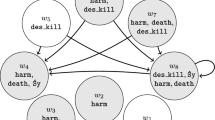Abstract
Stephen Read presented harmonious inference rules for identity in classical predicate logic. I demonstrate here how this approach can be generalised to a setting where predicate logic has been extended with epistemic modals. In such a setting, identity has two uses. A rigid one, where the identity of two referents is preserved under epistemic possibility, and a non-rigid one where two identical referents may differ under epistemic modality. I give rules for both uses. Formally, I extend Quantified Epistemic Multilateral Logic with two identity signs. I argue that a uniform meaning for identity tout court can be given by adopting Maria Aloni’s account of reference using conceptual covers. We obtain a harmonious set of rules for identity that is sound and complete for Aloni’s model theory.
Similar content being viewed by others
References
Aloni, M. (2001). Quantification under Conceptual Covers. PhD thesis, ILLC, University of Amsterdam.
Aloni, M. (2005). Individual concepts in modal predicate logic. Journal of Philosophical Logic, 34, 1–64.
Aloni, M., Incurvati, L., & Schlöder, J. J. Epistemic modals in hypothetical reasoning. Erkenntnis, pages 1–31, forthcoming.
Belnap, N. D. (1962). Tonk, plonk and plink. Analysis, 22(6), 130–134.
Brandom, R. (1983). Asserting. Noûs, 17(4), 637–650.
Brandom, R. (1994). Making it Explicit. Cambridge: Harvard University Press.
del Valle-Inclan, P., & Schlöder, J. J. Coordination and harmony in bilateral logic. Mind, forthcoming.
DeRose, K. (1991). Epistemic possibilities. Philosophical Review, 100, 581–605.
Dickie, I. (2010). Negation, anti-realism, and the denial defence. Philosophical Studies, 150, 161–185.
Dummett, M. (1991). The logical basis of metaphysics. Harvard University Press, Cambridge MA.
Fara, D. G. (2015). Names are predicates. Philosophical Review, 124(1), 59–117.
Ferreira, F. (2008). The co-ordination principles: a problem for bilateralism. Mind, 117, 1051–1057.
Frege, G. (1919). Die Verneinung: Eine logische Untersuchung. Beiträge zur Philosophie des deutschen Idealismus, 1, 143–157.
Incurvati, L., & Schlöder, J. J. (2017). Weak rejection. Australasian Journal of Philosophy, 95, 741–760.
Incurvati, L., & Schlöder, J. J. (2019). Weak Assertion. The Philosophical Quarterly, 69, 741–770.
Incurvati, L., & Schlöder, J. J. (2021). Meta-inferences and supervaluationism. Journal of Philosophical Logic, 1–34.
Incurvati, L., & Schlöder, J. J. (2021). Inferential expressivism and the negation problem. In R Shafer-Landau (Ed.) Oxford Studies in Metaethics, 16:80–107. Oxford University Press, Oxford.
Incurvati, L., & Schlöder, J. J. (2022). Epistemic multilateral logic. Review of Symbolic Logic, 15, 505–536.
Incurvati, L., & Schlöder, J. J. (forthcoming). Reasoning with Attitude. New York: Oxford University Press.
Klev, A. (2019). The harmony of identity. Journal of Philosophical Logic, 48(5), 867–884.
Kripke, S. A. (1980). Naming and necessity. Harvard University Press.
Moss, S. (2015). On the semantics and pragmatics of epistemic vocabulary. Semantics and Pragmatics, 8, 1–81.
Nimtz, C. (2019). Kripkean meta-semantics and generalized rigidity. The Philosophical Quarterly, 69(275), 332–353.
Ninan, D. (2018). Quantification and epistemic modality. Philosophical Review, 127, 433–485.
Novaes, C. D. (2015). A dialogical, multi-agent account of the normativity of logic. Dialectica, 69(4), 587–609.
Poggiolesi, F., & Restall, G. (2012). Interpreting and applying proof theory for modal logic. In G. Restall G. Russell (Eds.) New waves in philosophical logic, pp. 39–62, Palgrave MacMillan, London.
Prawitz, D. (1965). Natural deduction. a Proof-Theoretical study. Almqvist & Wicksell, Uppsala.
Prior, A. N. (1960). The runabout inference ticket. Analysis, 21 (2), 38–39.
Quine, W.V. (1953). From a Logical Point of View, Harvard University Press, Cambridge, MA.
Read, S. (2004). Identity and harmony. Analysis, 64(2), 113–119.
Read, S. (2015). Semantic pollution and syntactic purity. Review of Symbolic Logic, 8(4), 649–661.
Read, S. (2016). Harmonic inferentialism and the logic of identity. The Review of Symbolic Logic, 9(2), 408–420.
Rumfitt, I. (2000). Yes and No. Mind, 109, 781–823.
Schoubye, A. J. (2020). Names are variables. Philosophical Review, 129(1), 53–94.
Smiley, T. (1996). Rejection. Analysis, 56, 1–9.
Steinberger, F. (2009). Harmony and logical inferentialism. PhD thesis, University of Cambridge.
Tennant, N. (1999). Negation, absurdity and contrariety. In D. Gabbay H. Wansing (Eds.) What is Negation?, pp. 199–222, Dordrecht: Kluwer.
Veltman, F. (1996). Defaults in update semantics. Journal of Philosophical Logic, 25, 221–261.
Warren, J. (2015). Talking with tonkers. Philosopher’s Imprint, 15(24), 1–24.
Yalcin, S. (2007). Epistemic modals. Mind, 116, 983–1026.
Acknowledgements
I thank Maria Aloni and Luca Incurvati, as well as two referees for this journal, for helpful discussions on earlier versions of this work.
Funding
This work has received funding from the European Research Council (ERC) under the European Unions Horizon 2020 research and innovation programme (grant agreement No 758540) within the project From the Expression of Disagreement to New Foundations for Expressivist Semantics.
Author information
Authors and Affiliations
Contributions
not applicable
Corresponding author
Ethics declarations
Competing interests
None to declare.
Additional information
Publisher’s Note
Springer Nature remains neutral with regard to jurisdictional claims in published maps and institutional affiliations.
Rights and permissions
Springer Nature or its licensor (e.g. a society or other partner) holds exclusive rights to this article under a publishing agreement with the author(s) or other rightsholder(s); author self-archiving of the accepted manuscript version of this article is solely governed by the terms of such publishing agreement and applicable law.
About this article
Cite this article
Schlöder, J.J. Identity and Harmony and Modality. J Philos Logic 52, 1269–1294 (2023). https://doi.org/10.1007/s10992-023-09705-8
Received:
Accepted:
Published:
Issue Date:
DOI: https://doi.org/10.1007/s10992-023-09705-8



